Policy Advocacy
No. 10: The Resilience of Hong Kong’s Trade Ecosystem Amid U.S. Tariff Escalation_A 2024 Analysisl
Martin Cheung
(April 2025)
In April 2025, the United States imposed a 145% tariff on imports from China, including Hong Kong, raising questions about Hong Kong’s trade resilience (China Briefing, 2025). On April 16, 2025, USA Today reported a proposed 245% tariff on Chinese imports by the U.S., marking a significant escalation in the U.S.-China trade war (Anderson, 2025). This study evaluates Hong Kong’s capacity to adapt without U.S. trade, using 2024 data to assess survival potential, import substitution, and export redirection. U.S. trade, at HK$264.42 billion (2.79% of HK$9,464.5 billion total trade), is minor compared to Hong Kong’s diversified markets. Imports (HK$217.62 billion) can be sourced from Japan, South Korea, and Germany, while exports (HK$46.80 billion) can shift to China, ASEAN, and Europe. Despite short-term re-export challenges, Hong Kong’s service-driven economy and free port status ensure robustness, bolstered by strategic diversification efforts.

No. 9: Vocational and Profession Education and Training in HK— Do We Need a Reform?
Lawrence Chan Anita Chiu Amy Kwok and Karen Wu
(Nov 2024)
Vocational and Professional Education and Training (VPET) is vital for preparing individuals for specific professions, trades, and industries. Since the early 1980s, Hong Kong’s VPET providers have trained over 900,000 graduates, contributing nearly 24% of the workforce. These programmes offer hands-on training, equipping young people with essential skills and knowledge.
In today’s rapidly evolving economy, driven by technological advancements and automation, quality vocational training is more critical than ever for job market competitiveness.
This report provides a comprehensive overview of Hong Kong’s VPET system, covering its history, development, providers, programmes, and industries served. It also reviews recent government policies and compares Hong Kong’s VPET with Shanghai, Singapore, and Switzerland systems.
Despite ongoing government efforts, challenges remain for young people pursuing VPET in Hong Kong. By analyzing these issues and comparing them with other regions, the report proposes solutions and suggests expanding and innovating VPET to better prepare the workforce for the dynamic global landscape.
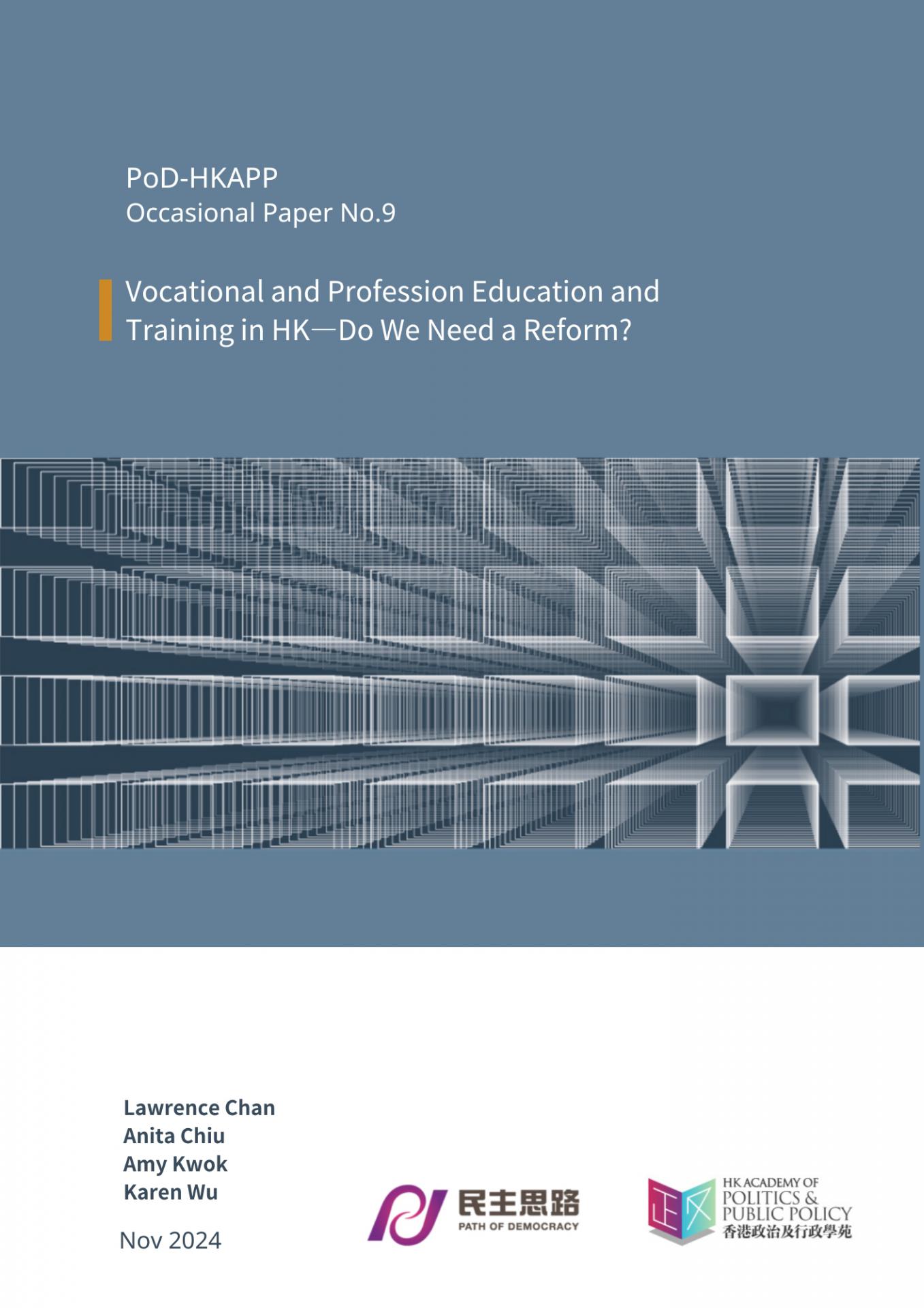
No. 8: Critiquing Sports Development Policy
Andy Li, Kelvin Lo, Bonny Loo and Manson Ma
(Sep 2024)
Based on a comprehensive review of sports development policies and practices from local and overseas governments, including the United Kingdom and Australia, as well as interviews with relevant stakeholders, this research project utilizes De Bosscher's SPLISS conceptual model (2006 and 2015) and SWOT analysis to examine the sports of sailing and dragon boat as case studies. The objectives of this project are to:
- critically review the Sports Development policy of the HKSAR Government (HKSARG) outlined in paragraphs 90 to 91 of the Chief Executive (CE)'s 2022 Policy Address;
- identify Hong Kong's strengths, weaknesses, opportunities, and threats in becoming a regional hub for sports development, sporting events, and sports tourism; and
- recommend policies and measures to facilitate the successful implementation of the Policy.
In summary, the recommendations include:
- empowering coaches;
- collaborating with commercial sponsors to host international sporting events;
- implementing special tax measures to incentivize sponsorship and investment in sports;
- promoting sports and cultural tourism through leisure activities such as sailing cruises and Dragon Boat rides for tourists; and
- transitioning the Sports Commission from an advisory body to a government agency with statutory functions and powers.
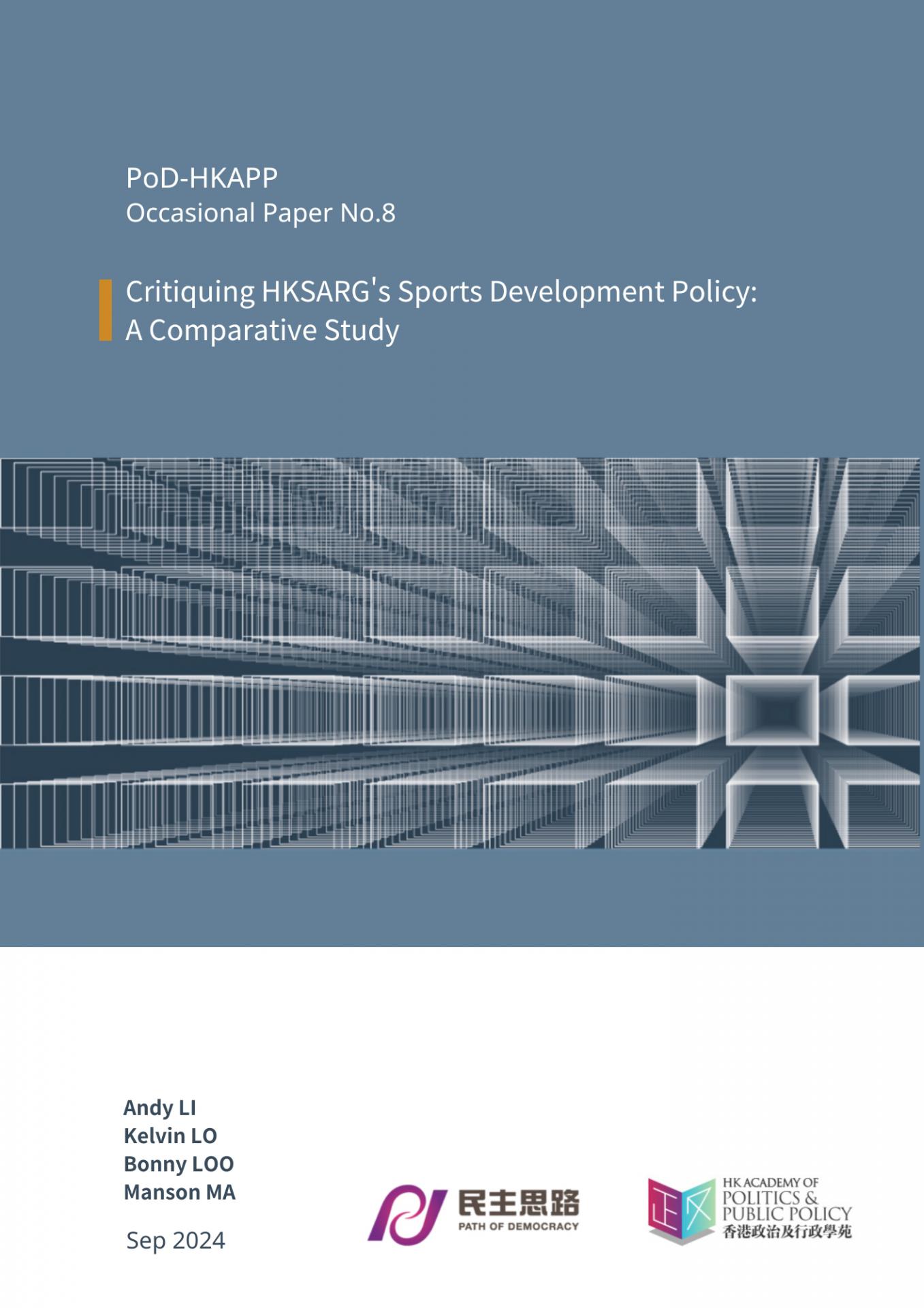
No.7: Study and Policy Recommendations of Youth Hostel
Allan Wong
(January 2024)
The current government continues to expand the “Youth Hostel” program with the aim of providing living spaces for young people, helping them “realize their aspirations,” and saving money for their future development. Path of Democracy has been closely monitoring the “Youth Hostel” policy and hopes that through this research, we can analyze and evaluate this policy that has been in place for over a decade. This report provides a comprehensive study and assessment of various aspects of the “Youth Hostel” policy.
The first part of the report is an introduction, outlining the content and purpose of the report. The second part primarily focuses on the results of an online survey, attempting to systematically analyze the policy within limited resources and evaluate the public’s awareness and opinions regarding the “Youth Hostel” policy. The third part provides an analysis of focus group interviews related to youth hostels, delving into the needs and expectations of hostel residents. The fourth part offers a research summary, while the fifth part provides a detailed evaluation of the policy, analyzing its inputs, performance, effectiveness, and efficiency from multiple perspectives. Notably, the sixth part redefines the “Youth Hostel” policy and presents conclusions and recommendations, offering new directions for the policy’s future development.
In conclusion, the report summarizes all research findings and analyses, providing a conclusion that aims to offer valuable guidance and reference for the future development of the “Youth Hostel” policy.
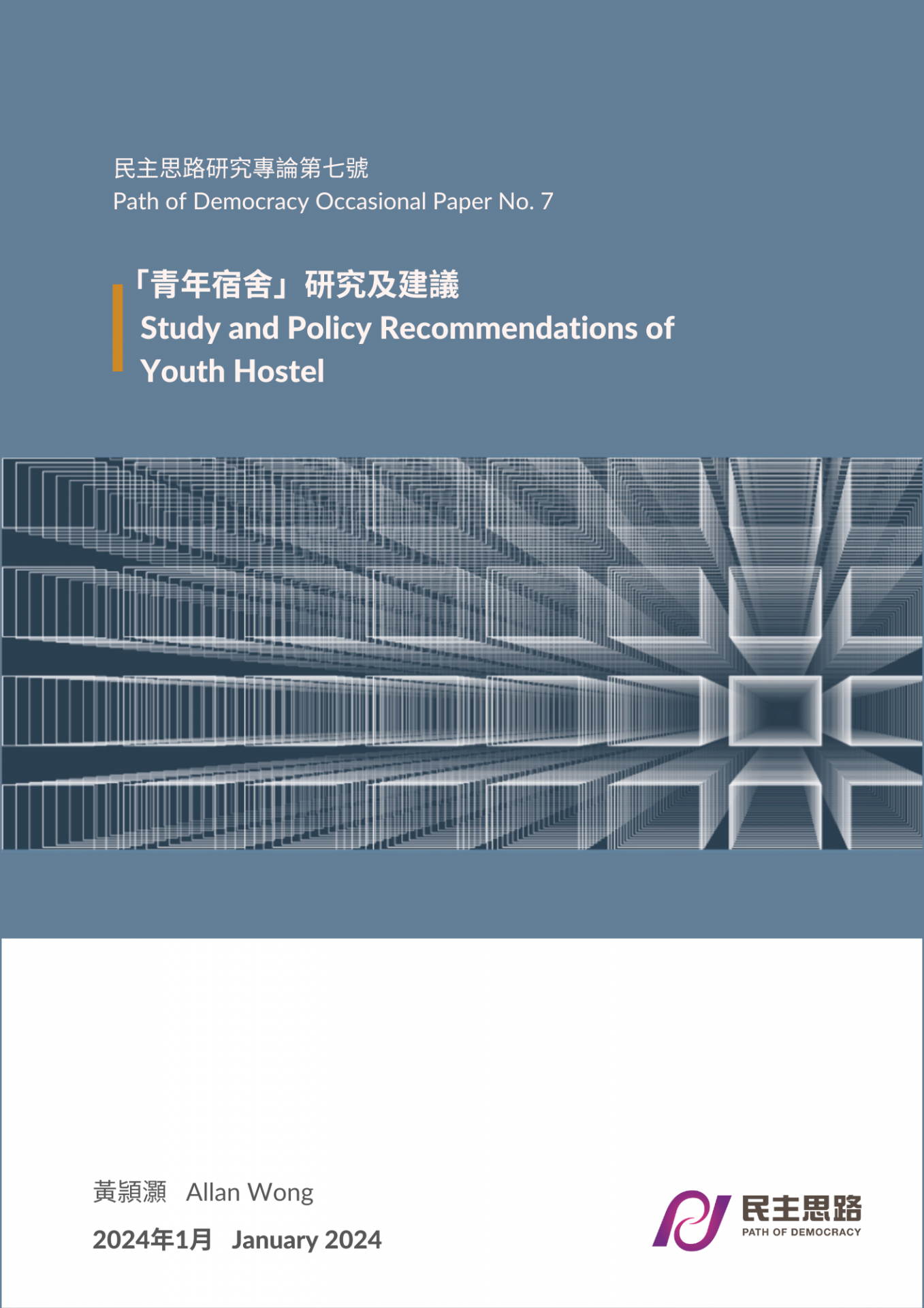
No.6: Policy Study of Elderly Communities
Jeffrey Chan
(January 2024)
As the aging population in Hong Kong continues to increase, the future challenge lies in the growing demand for suitable living environments and services for the elderly. Path of Democracy encourages the government to implement policies that promote more elderly care services and facilities to meet the diverse needs of senior citizens. Our proposed “Elderly Communities” policy not only addresses the current needs of elderly citizens at the grassroots level but also aims to provide a safe, comfortable, and socially interactive environment, ensuring the dignity of their lives. Considering the challenges and feasibility brought about by the aging population, our policy research is results-oriented with the following objectives:
-> Ensure that elderly citizens at the grassroots level and those lacking care receive the dignity they deserve.
->Address the issues in the elderly care industry to prepare for long-term development.
-> Make efficient use of resources.
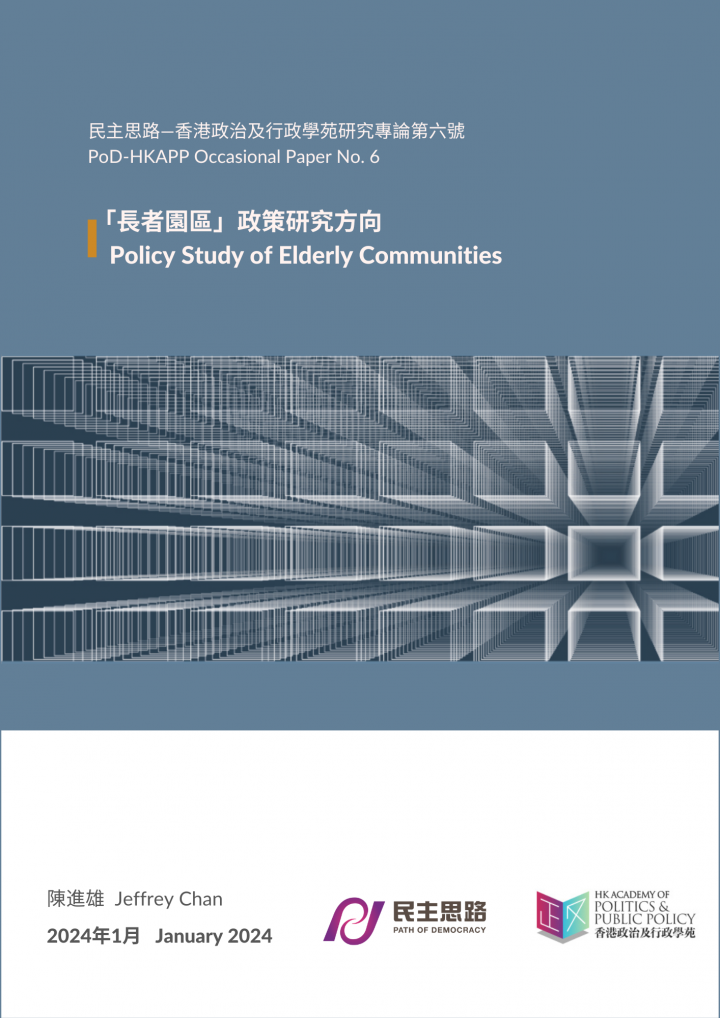
No.5: Hong Kong Sports Policy: Reforming the Triangulation of Community Sports, Elite Sports, and Major Sports Events (CEM)
Dennis Chong, Alice Fok and Liang Wei
(October 2023)
Sports regulations, policies and organisational structures are fundamentals for successful sports coordination and development, contributing to the flourishing and well-being of both individuals and whole societies. Hong Kong Sports Policy of community sports (C), elite sports (E) and major sports events (M) have had remarkable achievements in recent years. Given the background of a new Culture, Sports and Tourism Bureau will be established to better safeguard the development of sports in Hong Kong. The current study aims to gain more understanding of current problems of the Hong Kong Sports Policy and to propose effective and pragmatic suggestions for addressing the existing problems. A qualitative research design has been used in this research. A proposed CEM framework was developed, offering potential guidelines for its future rollout. Key recommendations include: (1) Establishing the Culture, Sports, and Tourism Bureau with a clear blueprint, periodic CEM reviews, enhanced management over SF&OC and NSAs, and promoting Chinese Sports Tourism; (2) Bolstering sports culture by raising citizen awareness, partnering with RTHK, and involving higher-ed students as event volunteers; (3) Increasing support for emerging elite sports; (4) Introducing sponsorship platforms like the New Sports Pilot Scheme; and (5) Elevating professional standards in coaching, training, and facilities management.
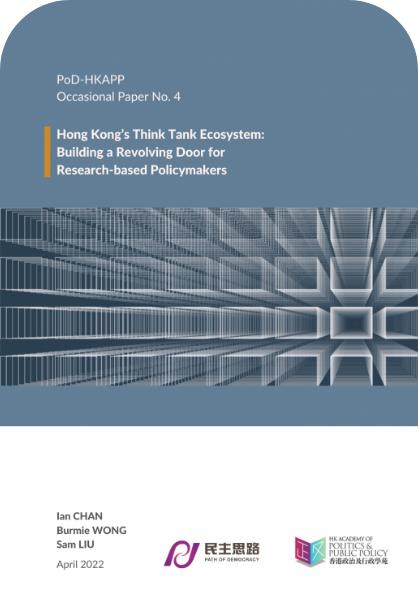
No.4: Hong Kong’s Think Tank Ecosystem: Building a Revolving Door for Research-based Policymakers
Ian Chan, Burmie Wong and Sam Liu
(April 2022)
The role of think tanks is becoming increasingly important globally, and they are crucial to policymakers worldwide. However, Hong Kong’s think tanks development has been very slow in the past 20 years. One might ask: What are think tanks? Why are think tanks so important? How to evaluate a think tank? What do think tanks look like in other regions? Why do Hong Kong’s think tanks develop at such a slow pace? What are the solutions to these problems? This paper answers all these questions. We studied the relevant literature, compared the situations of different regions, and conducted interviews. In the end, we summarized the key factors that enable the ecosystems of think tanks: Talents, Finances, and Impact. These three factors affect one another and form a cycle (as we call it, a ‘think tank ecosystem’). After diagnosing the problems of Hong Kong’s think tanks, in section 6, we propose seven suggestions that require the Hong Kong government’s top-down actions and the support to local think tanks. It is inevitable for the Hong Kong government to tackle the problem of insufficient policy research, and they have no excuse not to face it after the shift of the election regime. By solving the issue at the micro and macro level, with supply and demand in mind, we believe Hong Kong can address its weaknesses and form a healthy think tank ecosystem in the near future.

No.3: Building Up Political Trust in HKSAR
Sherman Chow, SK Leung and Allen Po
(March 2022)
In recent years, many Hong Kong people have seen declining levels of trust in our city, whether it be their confidence in the central government and the HKSAR Government or the mutual trust between each other. Citizens’ trust in the government has dropped to the lowest point during these two years. The main objective of this study is to find out different feasible evidence-based solutions to help building mutual trust among different stakeholders including the central government, the HKSAR government and the Hong Kong people.
The theoretical basis of trust relates the confidence of citizens to existing institutions in the society. With the fall of trust, people’s societal and economic concerns have turned into fears, which have led to a spread of populist actions by the government, and irrational responses to government policies by the public. If the government could improve its trust with citizens, the implementation of policies would be more efficient and the public could have a higher tolerance for measures. We review a series of events which happened in Hong Kong since 2008, including the Global Financial Crisis (2008-09), Five Constituencies Referendum Controversy, Extradition Law Controversy and the associated protests and the recent COVID-19 pandemic to explain the changes in level of trust that Hong Kong people have for the HKSAR Government.
As it is recognized that the trust level for the government is low, our proposed solutions aim at securing the prosperity and stability of the HKSAR, and they will be implemented in different time frames respectively. These solutions include (i) addressing the challenges from COVID-19 Pandemic and its impact on the economy in the short term; (ii) on-going clarification towards the misunderstanding of the National Security Law (NSL) and improving the Electoral System of HK in the medium term; and (iii) cultivating the talents of political leaders fitting “One Country Two Systems” to solve in-depth social issues.

No.2: Capacity Challenges and Countermeasures for Hong Kong as an International Financial Centre
Alan Lung (June 2022)
In the name of protecting Hong Kong’s freedom and high degree of autonomy, “hawks” within the U.S. Government has been pushing the Trump and now the Biden administration to deploy the financial decoupling ‘toolbox’ on Hong Kong and Mainland China. As the geopolitical conflict between China and the United States continues, the risks for Hong Kong losing its position as an international financial centre are real.
The success of Hong Kong as an international financial centre has been built on: political stability, openness, transparent governance, rule of law and freedom of the press. It is necessary for Central and HKSAR Government officials to acknowledge that China’s Reform and Opening had its roots in Hong Kong when communicating Hong Kong politics to the international media. Since the handover in 1997, the HKSAR Government has not improved its governance capability significantly. Assertive statements from Central and HKSAR officials beyond the need for national security could undermine the confidence of international investors in rule of law and press freedom in Hong Kong.
Hong Kong’s soft power comes from its diehard liberalism accumulated over the past 150 years. In future, Hong Kong must take on the role of “Hong Kong, China” and tell the new “Hong Kong story” and new “China’s Story” to the international community. This paper highlights Hong Kong’s irreplaceable role as China’s international financial centre. It also highlights the need to adopt a moderate approach in the implementing the National Security Law and responding to external political challenges.

No. 1: A Comparison of the Political and Economic Structure and Governance Capacity between Hong Kong and Singapore
Alan Lung (May 2021)
It is easy to see Singapore’s political stability, economic and general social resilience. Despite Hong Kong’s distinct geographical advantages, Singapore has outperformed Hong Kong and is beginning to challenge the latter’s status as Asia’s Financial Centre. Singapore’s outstanding performance is not an accident. It was the result of a highly effective and efficient ‘hybrid’ governance structure that outgrows its colonial archetype. On the other hand, the unresolved political dilemma in Hong Kong together with the ambiguity of keeping the ‘colonial’ government structure and reversion of sovereignty to China, is beginning to surface in the form of public discontent, less than vibrant economic growth and lack of upward mobility for the younger generation.
By comparing the similarities and differences in governance between Singapore and Hong Kong, this paper analysed the economic and social successes of Singapore. The “Switzerland of Asia” vision is not measured in gross GDP terms alone. Singapore’s success is corner-stoned by Lee Kuan Yew’s early vision of racial, education and housing equality and a cumulation of vision-driven development policies, socio-political stability, racial harmony and vigorous national security measures.


 EN
EN Login
Login Donation
Donation
